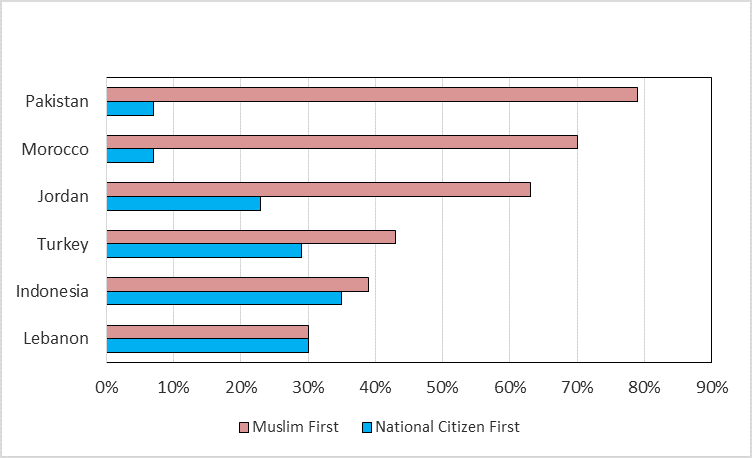 by Dan Wolf
by Dan Wolf
In About that 1% on Extremists, we started to look what extremism means and some general attitudes within the Islamic world. This article will turn that discussion to focus on politics. Law and culture will be covered in later articles. We will use the same source information as before. But first we are going to look at another general question asked of Muslims, which is ‘Do you consider yourself a national citizen first or a Muslim first.’ Responses from six countries representing most of the regions in the survey are shown below.

Figure 1: Percentage of Muslims who consider themselves[1]
Not a single country in this survey put national citizenship ahead of being a Muslim. This should not be surprising. Muhammad’s teachings put the ties of religion above those of blood in tribal Arabia. Muslims are called to be followers of Islam first, and that is why Islam’s tenets matter. Within an Islamic country, there is little if any difference between being a Muslim or a national citizen as governance is based on Islamic principles. These matter, however, if you extrapolate this position to non-Muslim countries as Islamic governance is not only contrary to, but incompatible with, all other governance forms. For those who want to know more about this topic, please see Islam and Form of Governance and US Law and Shari’a.
Relevant survey results related to politics include:
- Median % of Muslims who believe religious leaders should have a political influence.
- % of Muslims who say religious leaders should have a large or some influence.
- Median % of Muslims who prefer democracy over a strong leader.
The results are shown in the table below.
| Islam Political Role | Degree of Influence | Prefer Democracy | ||||
| Region | Pct | Number | Pct | Number | Pct | Number |
| Southern-Eastern Europe | 22 | 5 | – | – | 58 | 14 |
| Middle East – North Africa | 65 | 238 | 84 | 307 | 55 | 201 |
| Sub-Saharan Africa | – | – | 82 | 237 | 72 | 208 |
| Central Asia | 28 | 38 | 38 | 51 | 52 | 71 |
| South Asia | 69 | 370 | 69 | 370 | 45 | 241 |
| Southeast Asia | 79 | 184 | 91 | 212 | 64 | 149 |
| Totals | 835 | 1,176 | 884 | |||
Even though not all regions were surveyed, the results still represent roughly 50 – 70% of the population. This should not be surprising. Within Islam the church and state are one. All is Islam, therefore religious leaders should have an influence over all society’s aspects; including not only politics, but law, governance, civics, culture, the military, etc. as well. More about this later with culture.
The democracy result is interesting. Generally, when I have had a political discussion with a Muslim, the line of reasoning goes something like this: they do not have freedom in (insert a country here) because the leader at the top is corrupt, we need to replace the leader with someone who is not corrupt, then that country will have freedom. We use the same word, freedom, but it does not have the same meaning. It does not represent the same idea.
Within Judeo-Christian beliefs, freedom is a gift from God and necessary in fulfilling our purpose. We cannot be put into motion like inanimate objects and still fulfill our purpose of becoming good – like our God. Within Islam, the concept of Allah is built upon the works of Plotinus, particularly his Enneads. Allah has no being, no essence, no nature, but is instead nothing but pure will. Within this framework, there is no relationship possible between man and his Creator as He is inscrutable – unknowable.
According to Plotinus, freedom is the negation of a negative, it is what you have when you are not being coerced, because your normal state is not to be free but instead to be coerced, by your Creator, His representatives on earth (the state and/or church), or whoever’s power you lie under – a slave. Verses from the Qur’an support this position, and two of those are shown below. This same notion of freedom is similar to all other forms of collectivism, the only difference is that with these other forms (communism, fascism, progressivism, or socialism) freedom comes solely from the state.
‘I created the jinn and humankind only that they might worship Me.’ (S 52.56)
‘There is none in the heavens and the earth but comes unto the Beneficent as a slave.’ (S19.93)
In western culture, in places like America which rely on a Judeo-Christian governance philosophy, our freedom comes from within – it does not come from the state. Within Islamic culture, freedom comes from without. This is one reason why creating a republic within an Islamic country will never work, its ideology is incompatible with freedom as we know it. It is also one reason why western culture is viewed as a threat to Islam. The morals expressed by much of today’s music, television programming, etc. in the west are also a threat to Islamic culture, as these same sources are a threat to us who live in the west; these cultural artistic expressions have become perversions of what should reflect our core values.
Another example on this last point comes from the survey. The median % of Muslims who say religious freedom is a good thing is shown in the table below.
| Religious Freedom | ||
| Region | Pct | Number |
| Southern-Eastern Europe | 95 | 22 |
| Middle East – North Africa | 85 | 311 |
| Sub-Saharan Africa | 94 | 271 |
| Central Asia | 92 | 126 |
| South Asia | 97 | 520 |
| Southeast Asia | 93 | 217 |
| Totals | 1,467 | |
The survey goes further to say ‘Medians {percentages) show Muslims who say non-Muslims in their country are very free to practice their religion and consider this a good thing.’[2] The numbers are very high across all regions. But is this true? Consider, non-Muslims are not free to build new churches/synagogues, repair existing ones, ring bells, or perform other overt acts of worship within these countries. In some instances it is even illegal to possess a Bible. Non-Muslim populations have dwindled to non-existence in many of these countries, and continue to grow smaller. In addition, non-Muslims do not share the same legal status as Muslims.
Instead, they are subjected to laws and cultural norms intended to humiliate them in an effort to force them to convert. Think this is not true? You might want to see the following video from an Islamic cleric on Islamic conversions.
But the idea he expresses is not new, it comes from the dhimmitude practices that have been developed over the last thousand years (See The Abbasid Dynasty Part III, Dhimmitude). The non-Muslims who live in these countries must possess a level of devotion that we can only imagine.
What is more correct to say is that within western culture, religious freedom means one is free to choose what religion they will follow – even if their choice is no religion at all. Within Islam, religious freedom is synonymous with any non-Muslim being free to choose Islam at any time they wish. To support that point, we can look at one final result from these surveys. The table below contains the % of Muslims who say they would be very/somewhat comfortable with a son or daughter marrying a Christian.
| Son | Daughter | |||
| Region | Pct | Number | Pct | Number |
| Southern-Eastern Europe | 52 | 12 | 42 | 10 |
| Middle East – North Africa | 19 | 69 | 5 | 17 |
| Sub-Saharan Africa | – | – | – | – |
| Central Asia | 23 | 31 | 17 | 23 |
| South Asia | 11 | 60 | 6 | 33 |
| Southeast Asia | 7 | 16 | 3 | 7 |
| Totals | 189 | 90 | ||
While over 90% of Muslims say religious freedom is a good thing, only a little over 10% would be comfortable with a son marrying someone from outside of Islam – specifically a Christian – and less than half of that figure would be comfortable if it were a daughter. In this case, freedom is not the freedom to choose from all things, but instead the freedom to choose one thing alone. We will pick up the next article with law.
[1] Pew Research Center, How Muslims See Themselves and Islam’s Role, July 14, 2005. Other Pew Research Center surveys used in this article include Most Embrace a Role for Islam in Politics: Muslim Publics Divided on Hamas and Hezbollah (December 2, 2010) and The World’s Muslims: Religion, Politics, and Society (April 30, 2013). [2] Pew Research Center, The World’s Muslims: Religion, Politics, and Society, p.32, April 30, 2013.




